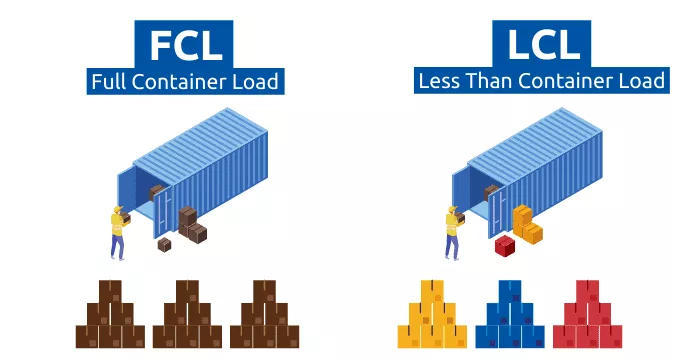Full Container Load (FCL) provides a shipment for one type of payload without having to share it with other shippers. Hence, the stored items inside the containers are “owned” by one shipper.
As opposed to FCL, the term “less than container load” (LCL) refers to the transportation of smaller amounts of payloads that do not occupy the entire space of a container. LCL container is also called a ‘consolidated container’. It is because it combines several payloads into a single larger shipment, generally a full container load (FCL). The procedure simplifies logistics and lowers delivery costs.
Full Container Load and Less Than Container Load

-
Speed of delivery
LCL takes longer transit time compared to full container load (FCL) because it has to account for unloading, grouping, and deconsolidation. Even, it will take longer time if one consignment in the shipping containers requires an inspection by the customs, causing the whole items to be put on hold. Whereas, FCL has a shorter transit time because the stripping process is done at the final destination.
-
Damaged goods
LCL exposes greater risk compared to FCL because it can hold various kinds of items such as corrosive, smelly, or liquid products that are shipped inside the same containers. Meanwhile, FCL has a lower risk of damaged goods because it carries one type of item.
-
Shipment cost
When determining whether to ship FCL or LCL, one of the key considerations is the cost of shipping. Although there are some rules you can comply with, there may be hazy areas where the choice between FCL and LCL is unclear.
LCL vs. FCL: Although you might not completely cover the container, there is a suggestion that the generally accepted practice is to use LCL for shipping low-volume shipments (between 2 and 13m3) and FCL for higher-volume shipments (13m3 and above). This recommendation is not, nevertheless, a law.
Even for volumes less than 13 m3, it may, in some cases, be preferable to ship a full container load (FCL). If you’re not sure whether to ship FCL or LCL, weigh both possibilities and ask your shippers for guidance. FCL and LCL rate stability can differ. As opposed to LCL shipping prices, which are typically more steady, FCL shipping rates are typically more unstable.
-
Security
Because FCL offers a direct path and a single consignee, the danger of damaged contents or loss can be minimized. As an added sense of security, insurance and container loading examinations are also offered.
Conclusion
LCL and FCL are different in so many aspects such as in terms of their speed of delivery, possible damage to the cargo, shipment cost, and security. However, to choose which type of cargo loading best accommodates the buyers’ needs, it is necessary to consider the number of stored items.
If the shipment carries on a single type of bulky cargo, opting for FCL is recommended. If the other way around conditions apply, LCL will work best.
To buy the right shipping containers to accommodate the specific shipping type, please fill in the quote on our web form. Our team of experts will help you to find the right container that works for you.


